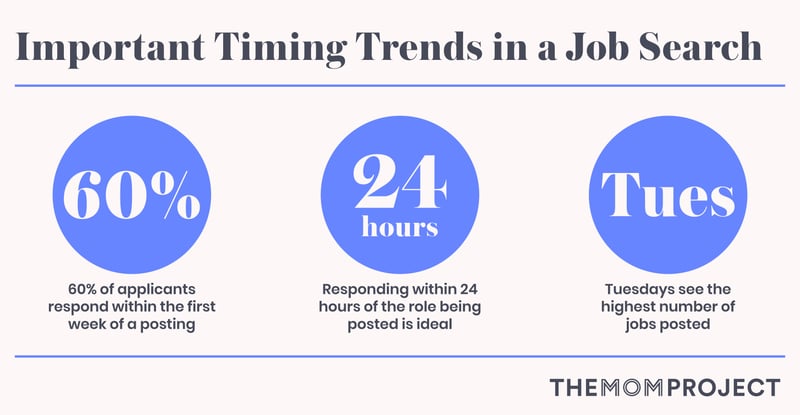As you begin your job search, it’s important to invest your time wisely because the average job search takes about 8 weeks or so. And that’s only when you are applying for the right number of opportunities, because finding employment is something of a numbers game after all.
In general, you don’t want to put all your eggs in one application basket when you are job hunting. Applying to one or even just a few roles won’t likely be enough. On the other hand, you also don’t want to do a “spray and pray,” where you fire off your resume for any position that even remotely makes sense for you (and a few that don’t) in hopes that one of them sticks. Instead, you have to find a middle ground where you spend time researching opportunities and tailoring your application materials to each promising role. That usually means you’ll submit around 10 to 15 applications each week.
👉 Research shows that applying to 10 to 15 jobs per week generally yields the best results when you’re actively searching for a new role.
If submitting 10-15 applications a week feels like a lot, remember that prepping a few versions of your resume and cover letter in advance lets you quickly apply to opportunities with a tailored application. This minimizes the time you spend applying daily and throughout the week while still positioning you for success.
Also consider this: applying to more than 10-15 jobs per week won’t speed the job search up. Conversely, it might actually slow things down if you’re blasting your resume out in response to every job opportunity you see.
Instead, a successful job search takes good habits. Here’s how to create ones that help you search strategically.

Before you apply for a new job
A smart job search starts with doing your homework. Before you begin applying, you’ll want to:
📝 Update your resume to reflect your most current experience. It’s okay to build a larger resume at first because you’ll tailor it to each role you apply to and select the experience you want to highlight and may cut some bullets, too.
💰Set a salary range you feel comfortable with. You’ll want to keep this in mind when you’re searching.
⚖️ Assess your skills by making a list of the hard and soft skills you have and any software or tools you’re familiar with.
❓Prepare your Why Me statement and cover letter that sums up who you are professionally and what you bring to the table. Use our Why Me template to help you write one.
🎯 Set some career search goals. Ask yourself, what are you hoping to get out of your next position that you don’t currently have? Use our printable Job Search Goals checklist to get started.
Once you’ve set some career search goals and prepared your application materials, it’s time to start applying strategically. The key is knowing how many jobs you should actually apply to. Too many and you’re likely sacrificing quality for quantity. Too few and you may be reducing your chances of landing “the one.” It is also important to remember that the more senior you are or the more niche your field is the less opportunities you may find. Ten to 15 is a general range, but the point is to apply for multiple jobs that feel like a good fit for your experience and interest.
Quality, not quantity in your applications
Applying to multiple jobs through a single site like The Mom Project won’t hurt your chances of being selected for an interview, but it is better to apply to fewer jobs and make each of those count by choosing roles that are more closely aligned with your experience, skills and goals.
As you evaluate potential roles, consider:
- Experience level: Is your experience level similar to what’s being asked for, and if not, do you have a strong case for applying anyway? Without that, this could be a wasted application.
- Skills: Do you have at least 50% or more of the skills the job requires? Remember, skills are universal across industries even if the software or process looks slightly different. If you have less than 50% of the skills, it may be unlikely you’ll land an interview.
- Salary range: If the salary is posted, is it in line with your expectations? If the salary isn’t posted, can you find information about the salary on Glassdoor, LinkedIn Salary or other tools?
- Management: Does the position require managing a team, and is that something you want to do?
- Company culture: Does the company have a reputation for being family-friendly?
- Any other factors that are critical to you such as work location, commute time, schedule flexibility and whether the position is full-time, part-time, contract or project-based.
Finding the Best Career Move for You
Ask yourself these questions during your career search to determine if a job opportunity is the right fit for you and your needs.
Finding your experience level fit
The jobs you’ll have the best chance of being asked to interview for will be in-line with or slightly ahead of where you currently are in your career path. It’s okay to aim high and apply for roles where you meet only some of the key criteria, but realize that there’s a lower chance of being asked to interview for these roles and balance them out by applying for at least an equal number of roles that you are qualified for.
If you are having a hard time finding roles that fit your experience level expand your search by:
- Using targeted job search sites like The Mom Project or industry-specific job boards
- Work with an industry-specific recruiter
- Share about your job search on LinkedIn, or contact your network personally if you prefer to keep it private
- Attend micro-networking opportunities like mixers or virtual meet-ups in order to meet new people
Track your efforts in the job search
It can be helpful to create a simple spreadsheet to track your applications. When you’re actively searching and trying to apply to as many potential roles as possible, it’s easy to accidentally apply twice. Especially if you’re using multiple sites and sources to search for jobs, a spreadsheet can help you keep track of where you’ve applied and when. Plus, you’ll be able to see if you are hitting your goal of 10-15 applications each week when you are tracking your efforts.
When the job search isn’t going well
Rather than applying all over the place and throwing your goals out the window, consider opening yourself up to contract, project-based or even part-time work to hold you over until you find a full time gig. Set up multiple job alerts - some that focus on full time work and some that focus on contract-style work that will fill the gap for you.
 Feeling Stuck?
Feeling Stuck?
If you feel like you’ve tried everything in your job search, watch this virtual session on the same topics to diagnose what might be going wrong. Watch now
Competition is high for many of the family-friendly roles we see, so it may be helpful to periodically check-in with your search and adjust your alerts, rewrite parts of your resume to better sell your story, and even call in a coach or mentor if you need some guidance.
A successful job search takes a significant time investment and effort from you. But, if you keep at it, the right job is out there as long as you keep searching.
Find more resources to help you in your job search
Looking for a new job involves plenty of moving parts. Get access to career opportunities with vetted, family-friendly employers and find answers to the most commonly asked career questions with The Mom Project. 




